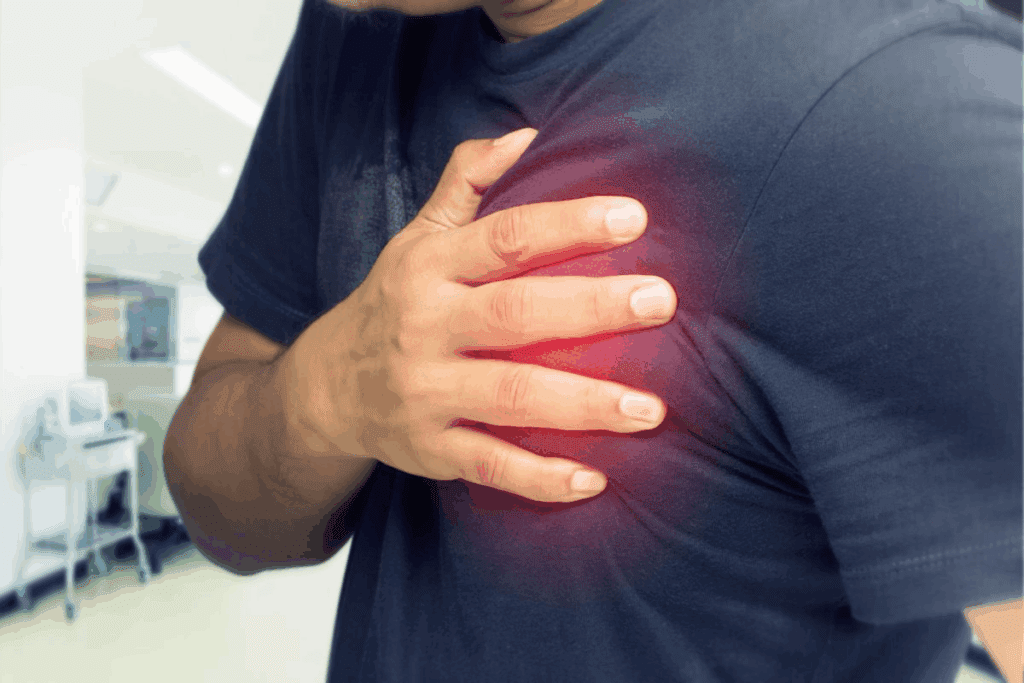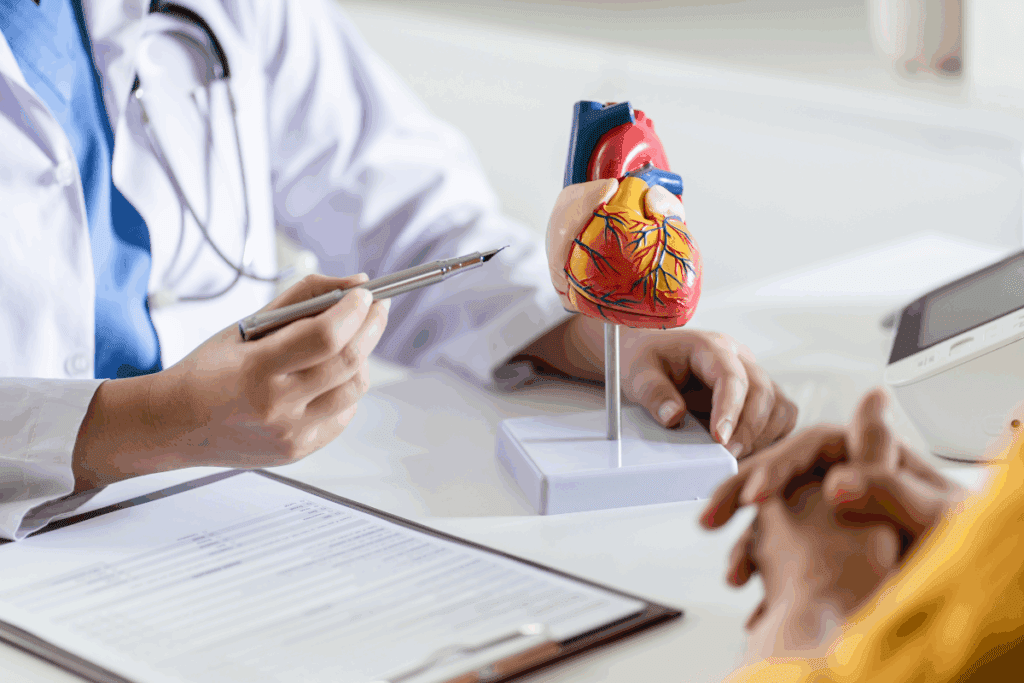Last Updated on November 25, 2025 by Ugurkan Demir

Knowing what “cardiovascular“ means is key to understanding heart health. At Liv Hospital, we think knowledge is essential for top-notch care. The term literally means “pertaining to the heart and blood vessels.”
The word “Cardi-” comes from the Greek “kardia,” which means “heart.” When you add “vascular,” which talks about blood vessels, you get the whole circulatory system. This is why knowing about cardiovascular health is so important.

Exploring the meaning of “cardiovascular” shows its importance in health. It refers to the heart and blood vessels’ structure, function, and diseases. This includes the heart’s anatomy and blood vessel diseases.
The cardiovascular system is vital. It includes the heart and blood vessels that carry blood. It’s key for delivering oxygen and nutrients and removing waste.
The term “cardiovascular” comes from Greek and Latin. It means related to the heart and blood vessels. This system’s health is essential for our well-being.
Key components of the cardiovascular system include:
Knowing “cardiovascular” is key in medicine. It helps diagnose and treat heart and blood vessel issues. Heart diseases are major health threats globally.
Cardiovascular health is vital. A healthy system is linked to better health and longer life. Lifestyle choices and medical care are important.
Some key aspects of cardiovascular health include:

To understand ‘cardiovascular’, we need to look at its origins. It comes from Greek and Latin. The term combines ‘cardio-‘ and ‘vascular’. Knowing these roots helps us see its importance in medicine.
The prefix ‘cardio-‘ comes from the Greek word “kardia,” which means “heart.” This root is in many medical terms about the heart. For example, “cardiac” means anything related to the heart. The journey of ‘cardio-‘ from Greek to today’s medical terms shows ancient Greek’s big impact on our language.
The root ‘vascular’ comes from Latin’s “vasculum,” or “small vessel.” In medicine, ‘vascular’ talks about blood vessels like arteries and veins. Together, ‘cardio-‘ and ‘vascular’ describe the heart and blood vessels, making up the cardiovascular system. Latin roots add precision and understanding across languages.
When we say “cardiovascular,” we talk about the heart and blood vessels system. The correct spelling is c-a-r-d-i-o-v-a-s-c-u-l-a-r. Used as an adverb, it’s “cardiovascularly.”
The term ‘cardiovascular’ has changed over time. It’s grown with medical science and our understanding of blood flow. For centuries, studying the heart and blood vessels has been key in medicine. Today’s term ‘cardiovascular’ shows how we now see the heart and blood vessels as connected.
Looking into ‘cardiovascular’ etymology helps us understand its meaning. It also shows why knowing medical terms is important. By breaking down the term, we see how history and language shape our medical language.
The cardiovascular system is key for our health. It includes the heart, blood vessels, and blood. It helps deliver oxygen and nutrients and removes waste.
The heart is a muscular organ that pumps blood. It has four chambers: the right and left atria, and the right and left ventricles. These chambers work together to circulate blood efficiently.
The heart’s pumping action is vital for blood flow and health. Any heart problem can cause serious issues, like heart failure.
Blood vessels transport blood all over the body. They are divided into arteries, veins, and capillaries. Arteries carry oxygenated blood to the body, while veins return deoxygenated blood to the heart. Capillaries are the smallest and help exchange oxygen, nutrients, and waste with tissues.
Blood is essential for our bodies. It carries oxygen and nutrients and removes waste. It has red blood cells, white blood cells, platelets, and plasma. Red blood cells carry oxygen, while white blood cells fight infections. Platelets help with blood clotting, and plasma is the liquid part of blood.
The cardiovascular system works together. The heart, blood vessels, and blood all play a role.
“The cardiovascular system is a marvel of biological engineering, where the heart, blood vessels, and blood work in harmony to sustain life.”
This system ensures our tissues get what they need and waste is removed. It keeps us healthy and functioning well.
In conclusion, knowing how the cardiovascular system works is key to understanding its importance. By seeing how the heart, blood vessels, and blood interact, we can value the complexity of cardiovascular health. This helps us see why a healthy lifestyle is so important.
Knowing what ‘cardiovascular’ means in medicine is key for diagnosing and treating heart and blood vessel issues. It refers to the heart and blood vessels’ structure, function, and diseases. This term is vital in healthcare, forming the basis for many medical fields and treatments.
The term ‘cardiovascular’ is used in many clinical settings. It includes cardiovascular diseases like coronary artery disease, heart failure, and high blood pressure. These diseases are major causes of illness and death globally. Cardiovascular medicine deals with diagnosing, treating, and preventing these diseases.
Cardiovascular medicine covers preventive steps, diagnostic tests, and treatments. This includes medications and surgeries like angioplasty and bypass surgery.
In diagnostics, ‘cardiovascular’ refers to tests for heart and blood vessel health. Tools like electrocardiograms (ECGs), cardiac catheterization, and MRI scans are used. These help find diseases early, allowing for quick action.
Treating cardiovascular diseases involves many steps. This includes lifestyle changes, medicines, and surgeries. Managing risks like high blood pressure, diabetes, and cholesterol is key. Treatment plans are tailored to each patient’s health and needs.
Understanding ‘cardiovascular’ helps healthcare providers give better care. This improves patient outcomes and quality of life.
It’s key to grasp the importance of heart health worldwide. Heart diseases are a big problem globally, hitting people everywhere.
These diseases do more than just harm health. They also affect society and the economy. The weight of these diseases is huge, touching many areas of life, from personal well-being to national economies.
Heart diseases are the top killers globally. They cause nearly one-third of all global deaths, making them a major health worry. In poorer countries, getting help and prevention is harder.
The numbers on heart diseases are scary. Heart diseases lead to about 17.9 million deaths each year. This is about 32% of all deaths worldwide, showing how big the problem is.
Looking closer, coronary heart disease and stroke are the biggest killers. They cause a big part of these deaths.
The effects of heart diseases on the economy and society are huge. The cost of heart diseases goes beyond just healthcare, hitting productivity, economic growth, and social stability. In many places, the economic cost of heart diseases is very high, taking away resources for other important health and development needs.
The social impact on families and communities is also big. This is true, even more so when heart diseases hit young people or those in their prime. This shows we need strong plans to stop and manage heart diseases, to lessen their impact on society.
Understanding the global impact and importance of heart health helps us tackle heart disease challenges. We need to focus on healthcare and also on public health strategies for prevention and early detection.
Exploring ‘cardiovascular’ shows us how it’s spelled and used in language. It’s key in medical talks, so getting it right is important.
Many wonder how to spell ‘cardiovascular’. It’s spelled C-A-R-D-I-O-V-A-S-C-U-L-A-R. Breaking it down helps: ‘cardio-‘ means heart, and ‘vascular’ means blood vessels.
Writing it out helps remember. Here’s a table to show the correct order:
| C | A | R | D | I | O | V | A | S | C | U | L | A | R |
| C | A | R | D | I | O | V | A | S | C | U | L | A | R |
The adjectival form ‘cardiovascular’ describes heart and blood vessel health. The adverb ‘cardiovascularly’ is rarer but used to describe how something affects heart health.
For example, someone might be cardiovascularly fit, meaning they have a strong heart and good blood flow. Using the right form makes health talks clearer.
‘Cardiovascular’ is in many phrases in health and everyday talk. Examples include ‘cardiovascular disease’, ‘cardiovascular health’, and ‘cardiovascular exercise’. These phrases are vital in health education and medical plans.
Here’s a list of common phrases:
Knowing these phrases helps talk about heart health clearly. Using ‘cardiovascular’ correctly makes medical info clear and precise.
Understanding heart health is key to better medical care worldwide. Our research into the heart system is getting more detailed. This is driving new treatments and ways to prevent diseases.
Our study of heart diseases has grown a lot. We now go beyond just treating symptoms. We look at the real causes, like genes, lifestyle, and environment. This shift has led to better treatments and ways to stop diseases before they start.
Today, heart medicine research focuses on several areas. We’re working on new medicines, better surgery methods, and using digital health tools. Personalized medicine is becoming a reality, with treatments based on your genes and health risks. We’re also looking into how diet and exercise can prevent heart diseases.
Heart research brings together many fields, like cardiology, epidemiology, and genetics. This teamwork helps us understand heart health fully. It goes from the tiny details of disease to creating new medical tools and treatments. By working together, we can quickly turn research into better care for patients.
The future of heart medicine is bright with teamwork and new ideas. By using new tech and methods, we’ll learn more about heart diseases. This will help us give better care to patients all over the world.
Today, healthcare is changing how it handles heart diseases. It’s moving towards a more complete, patient-focused care. This change is thanks to new ways of working and advanced technology.
Heart care now needs a team effort. Doctors, surgeons, and radiologists work together. Liv Hospital shows how this teamwork can help patients fully.
New methods and tools are key in heart care today. Advanced diagnostic tools and new surgeries help patients better. Liv Hospital leads in using these to help patients with less harm.
Liv Hospital aims to be a top name in heart care. Their program offers team-based, innovative, and top-notch care. They use the latest in medicine and focus on the patient.
“Our commitment to delivering world-class healthcare is reflected in our comprehensive cardiovascular care program, which combines cutting-edge technology with a multidisciplinary team of experts.” – Liv Hospital
Institutions like Liv Hospital are changing heart care. They use new methods and focus on the patient. This is raising the bar in the field.
Knowing about cardiovascular health is key to lowering death rates and boosting well-being worldwide. The term “cardiovascular” is vital in medicine, showing its huge impact on health. It covers the heart and all blood vessels, along with the blood they carry.
Heart diseases are a top killer globally, making heart health super important. We need to keep learning and spreading the word about it. This helps people live healthier lives and avoid heart problems.
Good heart health is not just about personal health; it affects society and the economy too. Medical science keeps getting better, and heart health is a big focus. Places like Liv Hospital lead the way in heart care, showing new ways to help patients.
‘Cardiovascular’ means related to the heart and blood vessels. It comes from ‘cardio-‘ (heart) and ‘vascular’ (vessels). This term describes the system that moves blood around the body.
‘Cardiovascular’ comes from Greek ‘cardio-‘ for heart and Latin ‘vascular’ for vessels. Knowing its roots helps understand its full meaning.
It’s spelled C-A-R-D-I-O-V-A-S-C-U-L-A-R. Correct spelling is key for clear medical communication.
The cardiovascular system includes the heart, blood vessels, and blood. It works together to move blood, deliver oxygen, and remove waste.
Knowing about cardiovascular health is key because it affects many deaths worldwide. Heart diseases are a top cause of death globally, making education and awareness critical.
Common heart diseases are coronary artery disease, heart failure, and stroke. These often stem from high blood pressure, diabetes, and lifestyle choices.
In medicine, ‘cardiovascular’ describes heart and blood vessel conditions, treatments, and tests. It’s a key term in cardiology and internal medicine.
‘Cardiovascularly’ describes something related to the heart and blood system. It’s used in health, fitness, and medical discussions.
Phrases like ‘cardiovascular disease,’ ‘cardiovascular health,’ and ‘cardiovascular exercise’ are common. They’re used in health, fitness, and medical talks.
Liv Hospital uses a team approach for heart care, with the latest methods and innovations. Their care model aims to offer top-notch treatment and support.
Heart diseases cause a lot of deaths and illness worldwide. They affect not just people but also economies and societies, making them a big public health issue.
Subscribe to our e-newsletter to stay informed about the latest innovations in the world of health and exclusive offers!